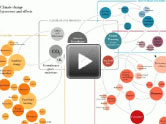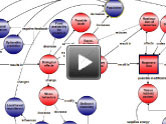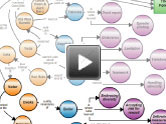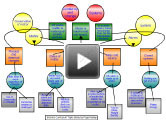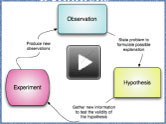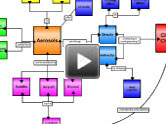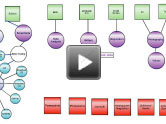 |
|
|
| SEARCH | EDUCATOR WEBINARS | ||||||||||||||||||||||||||||||||||||||||||||||||||||||||||||||||||||||||||||||||
|
Incorporating Concept Maps into the Classroom
Jenny Albright, Tabor Academy, Marion, MA Wednesday, December 1, 2010 High school marine science teacher Jennifer Albright described her journey through graduate school where she worked closely with COSEE-OS
and collaborated with scientists in the development of content-rich concept maps. She has been employed for almost two years at a private
academy where she incorporates these tools in her classroom teaching. She also discussed an "Oceans First" curriculum at her school that
takes advantage of the interdisciplinary nature of ocean science to integrate physical and chemical science into a biology course.
Educator's Materials
Video Clips: Separate Concepts to Big Picture | Students Make Maps | "Ah-Ha" Moment
Exercising Higher Order Thinking Skills
Beth Campbell, University of Maine Wednesday, October 6, 2010 Educator and graduate student Beth Campbell attributed the value of concept mapping as a teaching and thinking tool to the way it requires one to
exercise higher order thinking skills in order to conceptualize and explain relationships between ideas and processes. She discussed the benefits
and challenges of teaching students to use concept maps. She also shared an example of a complex map
she developed over several months to help her organize her current graduate research about injury and regeneration in marine polychaetes.
Educator's Materials
Video Clips: Tracking Student Progress | Common Challenges | Making Complex Maps
Exploring Life Pathways with Concept Mapping
Annette deCharon, Darling Marine Center Wednesday, October 20, 2010 Annette deCharon, COSEE-OS director, talked about the components of concept maps and the challenges many people have when they begin constructing
them. She shared the "Luke Skywalker" technique she uses to help people get
comfortable with the mapping process and as a method for learning about each other and for team building. Attached to Annette's maps are a variety of useful and fun
resources specifically designed as "warm-ups" for concept map skill-building: these include "Conceptionary" (a variation on Pictionary), which provides practice in
thinking about complex concepts and ideas, and "At the Movies", an exercise for honing linking phrases.
Educator's Materials
Video Clips: Scientist and Educator Perspectives | Team Building | Value to Students
Different Thinking Styles Reflected in Concept Maps
Sharon Gallant, Gardiner Area High School, Gardner, ME Wednesday, November 17, 2010 High school science teacher Sharon Gallant presented an enlightening introduction to concept mapping. She explained what concept maps are and why they are such useful
teaching tools. She threaded seamlessly into her talk numerous concept maps created by her students that illustrated different uses and purposes for mapping, and showed
varied thinking styles and levels of understanding.
Teaching Students to Concept Map
Sue Klemmer, Camden Hills Regional High School, Rockport, ME Wednesday, September 26, 2010 Educator Sue Klemmer was inspired to use concept mapping when she was taking a graduate course, and first read Learning How To
Learn by Novak and Gowin. She gave a detailed overview of how she's been teaching her students to concept map for reading comprehension and shared some of the
teaching strategies she uses with her students when they are learning to concept map. She mentioned that students learn better when they reflect on their learning (through
metacognition) and several things that educators should keep in mind when trying the method with their students. Sue also shared the rubrics that she uses to evaluate student
concept maps.
Educator's Materials
Video Clips: Identifying Misconceptions | Benefits for Students | Teaching the Process
Using Concept Maps to Train Staff
Kate Leavitt, Seacoast Science Center, Rye, NH Wednesday, November 3, 2010 At a COSEE-OS workshop held in 2009, Kate Leavitt collaborated with University of New Hampshire scientist, Hui Feng, on his
concept map about ocean aerosols. In this webinar, Kate described how she subsequently worked with Dr. Feng to adapt his map
as a training resource for her co-workers at the Seacoast Science Center.
She discussed the challenges informal educators face in translating high-level science content for general audiences who visit the center. Kate's presentation described
useful techniques for explaining somewhat abstract ideas like clouds, aerosols and gases, and she shared lesson plans and activities that could be adapted to a variety of
educational settings.
Managing Interdisciplinary Projects with Concept Maps
Louise McMinn, Scofield Magnet Middle School, Stamford, CT Wednesday, August 10, 2010 Educator Louise McMinn shared her experiences implementing an interdisciplinary grant on water quality with her
colleagues. By using concept maps to define the roles of the teachers and students involved in the project, she found it easier to get everyone "on the same page"
about the project's execution. Students embraced their assigned "jobs" with enthusiasm, and fellow educators felt connected to the project, even across
disciplines.
|
|
|||||||||||||||||







